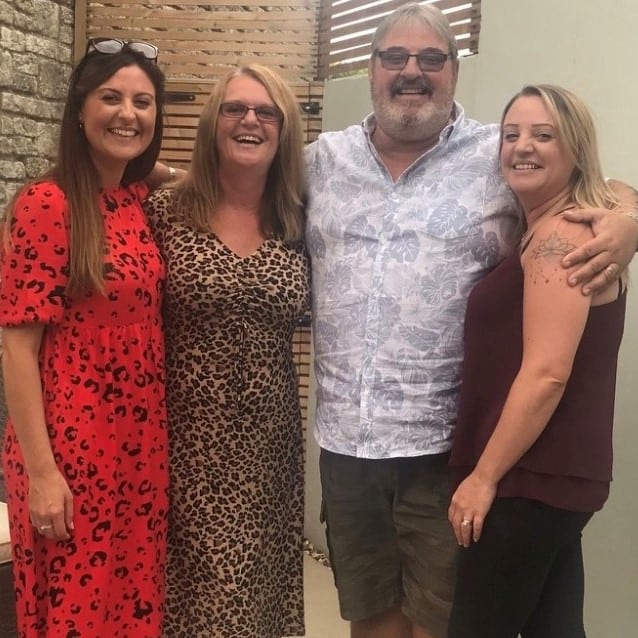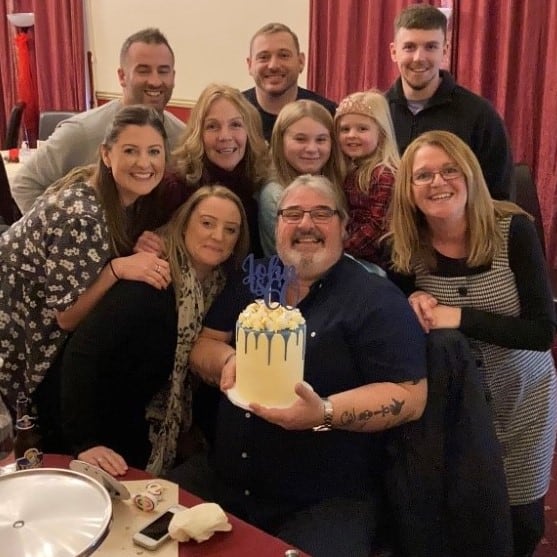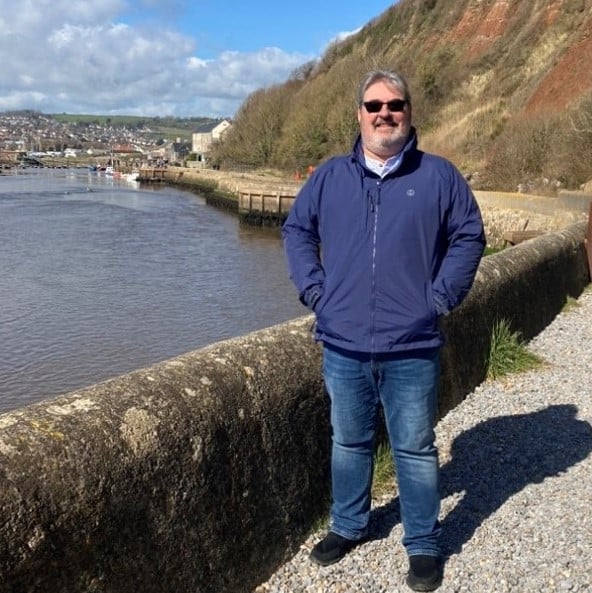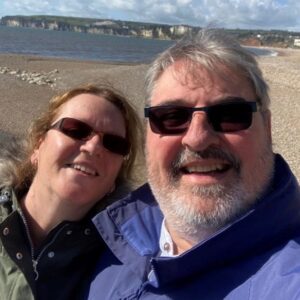Please be aware this case study describes a terminal liver cancer diagnosis
“I wish I knew that there was research into liver cancer, but I can’t really find anything, so I’m sharing my dear husband’s story in the hope that I can help research into this little talked about cancer.” Thank you for sharing your story with us, Angela
John and I met at catering college when we were both 17, got married when we were 19, had our first daughter at 21, the second daughter at 23 and were married for 42 years.
About 12 years ago John became very unwell, was really sweating, had no energy, pains in his arms and legs and his pee was amber-coloured. They treated him initially for a urine infection, but I thought it was more serious and asked for blood tests. John was then diagnosed with hepatitis E – his ALT went up to 4,000 – they thought he had liver failure at one point. I looked after him at home and the doctor kept ringing and said if John couldn’t flap his arms that meant he was going into liver failure so would have to go to hospital. But then he plateaued and began to recover, he didn’t have any treatment apart from taking lots of fluid. Evidently you get hepatitis E abroad, but we hadn’t been anywhere.
It took a long time for John to feel better and he was never the same after that. He already had type 2 diabetes and was on insulin, statins, beta blockers and blood pressure medication and was now referred to a liver consultant. Six months later he was diagnosed with NAFLD and told about diet and exercise. It was an absolute struggle though, he loved his food and having an Indian on a Saturday night. He would say “I’m trying” and eat salads, but it was portion sizes with him.
He wasn’t a drinker, but people assumed that he drank because he had liver disease. Even at the hospital they would always ask if he drank and one nurse said: “Are you sure?” He got cross and replied: “I do not drink!”
After lockdown John was having regular blood tests and scans again, but they were only ultrasounds. He kept saying he had a weird ache where his liver was and he had a hard tummy, but the scans were normal so we didn’t think anything of it
During Covid the liver team kept saying they were going to ring him, but they never did. I don’t think John saw anyone for close to two years, so in the end we contacted the hospital ourselves. All of a sudden everything started moving – the nurse rang and asked how he was, but it was mainly phone calls. John was having regular blood tests and scans again, but they were only ultrasounds. The last one he had was in February 2022 and he was told it was a typical scan, but they hadn’t been able to see properly. Towards the end of Covid he kept saying he had a weird ache where his liver was and he had a hard tummy, but the scans were normal so we didn’t think anything of it. I do wonder now if that was some sort of sign.
By May 2022 he had been breathless for a little while but John being John he wouldn’t go to the doctor until I rang up, made him an appointment and told him he had to go. The doctor said John had a blood clot on his lung and would send him for a scan. In the meantime his liver bloods were due and he had those done in the same week. Two weeks later we got a letter telling him to go for two more scans. The liver nurse had requested it because his tumour marker was really high.
We were worried but John and I were thinking it was probably blood clots. I sat in the hospital waiting room while he went for the scan. I was watching all of these people coming out of the scanning room, but John wasn’t coming back, then a nurse called me in. She said they’d found lots of blood clots in his lungs so the doctor was going to have a look.
I sat next to John and said: “They’ll put you on a blood thinner and you’ll be fine.” But by now he was really breathless and was admitted to the acute admissions ward and put in a side room. I thought: “This doesn’t feel right.” A doctor then came in – the first time we’d seen anyone face-to-face. She asked: “What have you been told?” Then she said John had a tumour that had almost filled his liver. It was so big that it had gone into his aorta and his lungs and that he was dying. He had three to six months left.
We both burst into tears. John kept saying: “I don’t want to die.”
How would we tell the children?

They called it hepatocellular cancer and gave us all these books to read – they were all about cure and treatment, but John was dying. There was nothing about what to expect and how would he feel. It made me cross and I threw them in the bin when we got home.
The whole point of the regular scans and bloods, I was told, was that if there were any changes they could act upon them. They said it was a very aggressive liver tumour and they can grow quickly, but I can’t believe his scan was normal in February and he was dead by the end of June. That meant it would have started in March.
We were referred to the local hospice but because of Covid nobody called us and we came home with no support, no nothing. Our doctor was dreadful – trying to even get a visit to a dying man was like pulling teeth. I complained to the surgery. Up until the day John died we didn’t have any support. I had my family and friends and without them I don’t know what I would have done. It was dreadful care, but he was at was home where he wanted to be and surrounded by his friends and family.
The last three days John really struggled to move or do anything, because his legs were so swollen. I had to almost carry him to the toilet. Up until then he’d been showering and getting dressed. He’d watch TV, then go lie on the bed. He’d always been a very proud, clean man and liked to have his aftershave on.
The day before he died John’s breathing was just so bad that I called the GP – and I’m so cross with him that I don’t even want to go there. John kept saying he was freezing cold, but he was sweating and by now his legs were swollen almost up to his hips. In desperation I rang the hospice at 11pm and they were at my door by 1am. They came with oxygen and were brilliant and so kind. The hospice nurse organised morphine and all the drugs he needed, I didn’t understand why the GP couldn’t have done that.
The hospice couldn’t believe John didn’t have any oxygen, pills or painkillers. He had nothing until the day before he died
The hospice couldn’t believe John didn’t have any oxygen. No pills, no painkillers, no nothing until the day before he died. His GP said I should give him paracetamol – can you believe that? John kept telling him he felt sick and the doctor said have a sip of lemonade, but he couldn’t drink.
The hospital said John would become very confused before he died, but he didn’t and right up until his last breath he was telling the girls he loved them. He died just two weeks to the day after the diagnosis.

I’ve got very good family and friends and four grandchildren from age of two to 19, so there’s always someone in my life keeping me going. I am very blessed in that way, but John’s death has left a gaping hole in my life and even now, a year later, I still struggle with it all. I can’t believe the tumour was missed. Maybe if he’d had a CT scan instead of all these ultrasound scans… I just don’t know.
There are so many people out there with fatty liver disease, but you don’t hear anything about it. We need to educate people about diet
I don’t think people realise the impact that being overweight can have. There so many people out there with fatty liver disease, but you don’t really hear about it. It’s not just alcohol that causes liver disease we need to educate people about diet too. I’d like to see more leaflets and posters in doctor’s surgeries. There’s breast cancer awareness all the time, cervical cancer, prostate cancer there’s loads about it everywhere, but the first time I ever heard liver cancer mentioned in the media was on BBC Breakfast in June this year (2023).
It was quite difficult to find out anything about liver disease when John was first diagnosed, there was not a lot of information out there. If I’d been given a booklet from the British Liver Trust I could have rung the nurse helpline and asked if John’s hard tummy was normal. I could have asked other questions too – that would have been good.
It probably wouldn’t have made any difference, but you just don’t know.
If you’ve been affected by the issues described in this story, please contact our free Nurse-led Helpline on 0800 652 7330, Monday-Friday 9am-3pm, for emotional and practical support.


